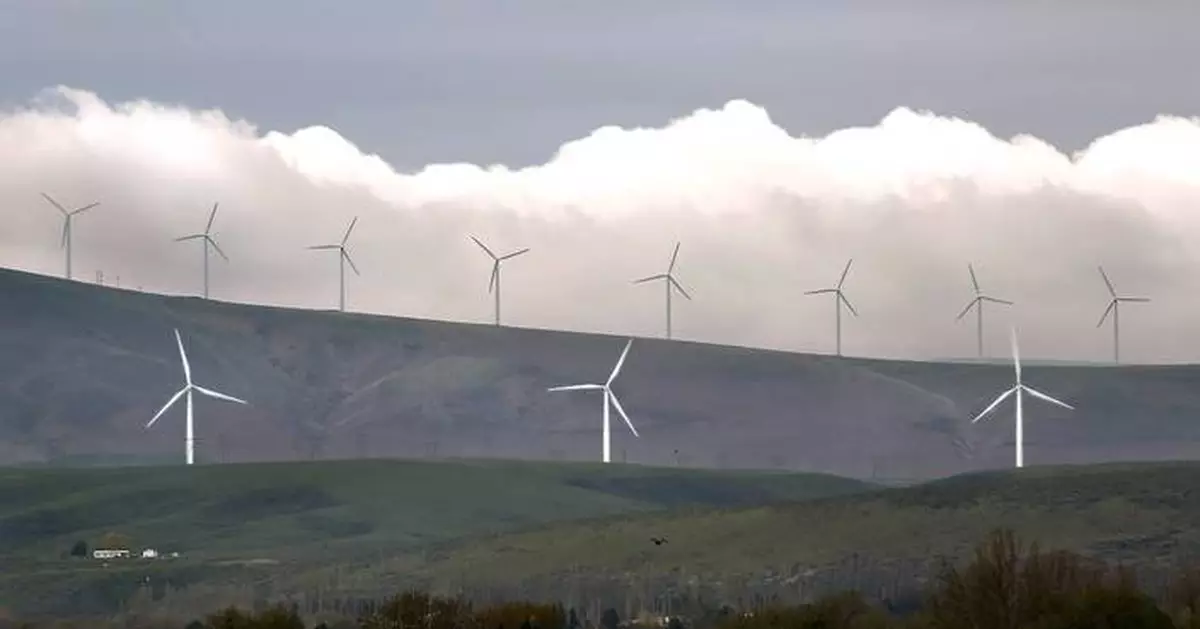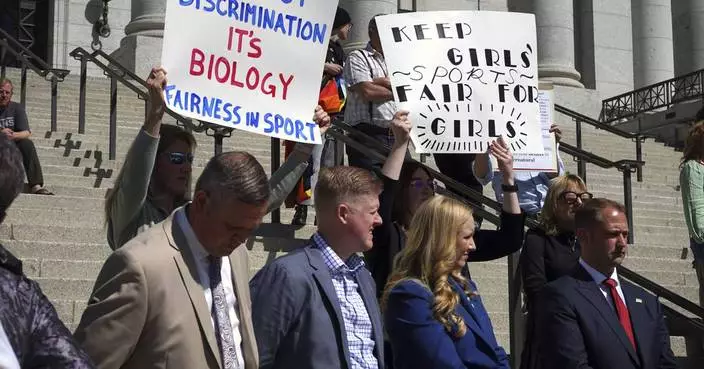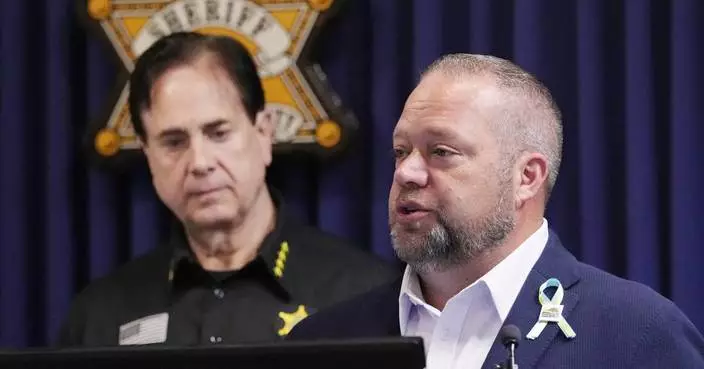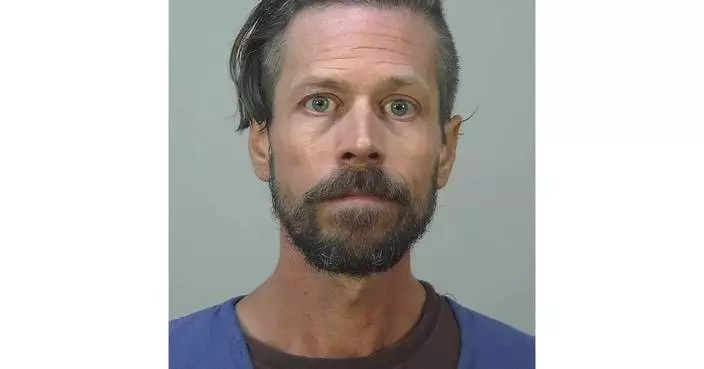OLYMPIA, Wash. (AP) — Washington Gov. Jay Inslee on Thursday rejected a recommendation to cut a proposal for what would be the state's largest wind farm in half, giving new life to the $1.7 billion project.
Plans for the Horse Heaven wind farm originally included up to 222 wind turbines across 24 miles (38.6 kilometers) of hillsides in the Tri-Cities area of eastern Washington, plus three solar arrays covering up to 8.5 square miles (22 square kilometers).
But last month, Washington’s seven-person Energy Facility Site Evaluation Council, a clearinghouse for permits required by large projects, recommended slashing the proposal in half because nests of the endangered ferruginous hawk were found in the area, The Seattle Times reported.
Inslee on Thursday rejected the council’s recommendation and told the group to reconsider in hopes of expanding the project closer to its full potential. A Democrat who is not seeking reelection after three terms in office, Inslee has sought to make climate initiatives key to his legacy.
Since the wind farm project was proposed in 2021, it has pitted local opponents against the state’s ever-growing need for renewable energy. In a letter to the site evaluation council, Inslee noted that Washington’s energy demands could nearly double by 2050.
As for those in the area who don’t want to look at the turbines, he said that’s not enough of a reason to reject the project outright.
“It is clear that the turbines will be visible only from a distance and none of the turbines will loom over anyone’s home,” he wrote.
Inslee asked the council to try and offer the Yakama Nation better access to the lands — which hold cultural and historical significance — but to still restore most of the planned wind farm. Tribal communities along the West Coast have expressed frustration with what they say is a lack of consultation on such proposals that affect culturally significant waters and land.
The council has deliberated over the Horse Heaven wind farm for over three years. Now it has just three months to consider the governor’s notes and revise its original recommendation, the governor noted.
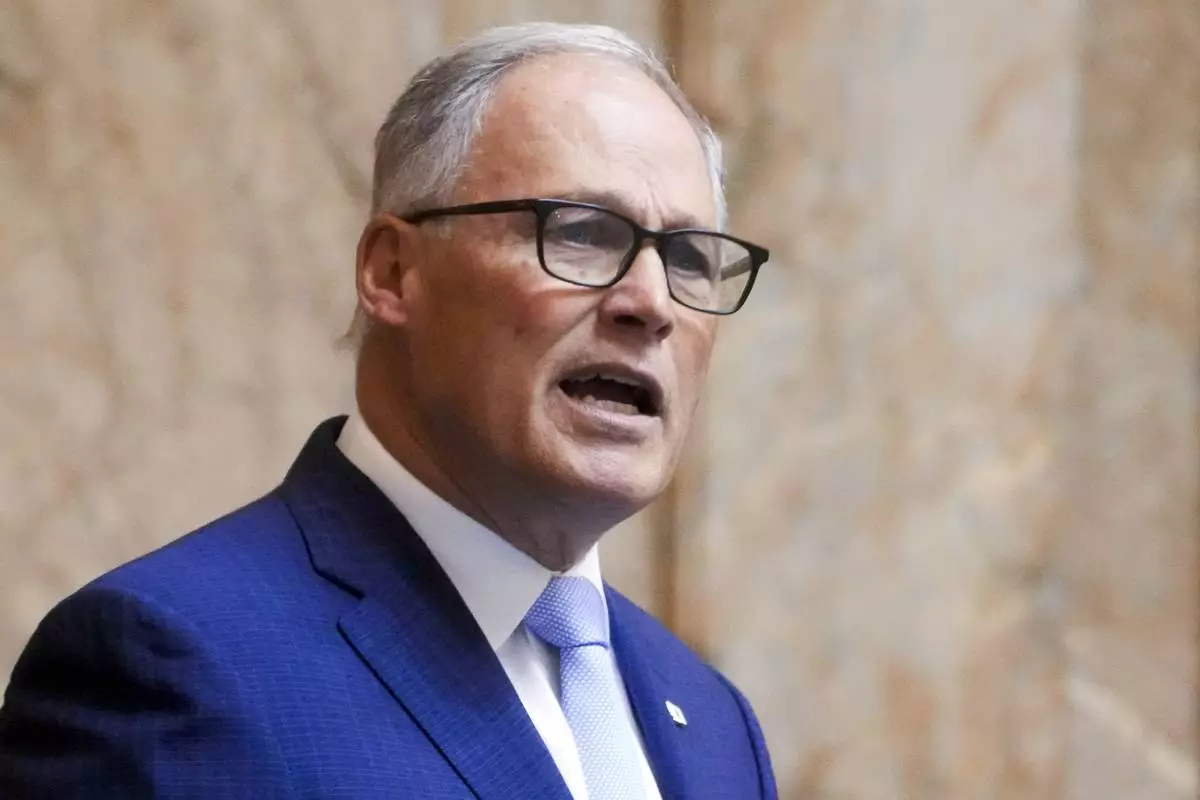
FILE - Washington Gov. Jay Inslee delivers his annual State of the State address to a joint legislative session in House chambers at the Washington state Capitol, Jan. 9, 2024, in Olympia, Wash. Inslee on Thursday, May 23, rejected a recommendation to cut a proposal for what would be the state's largest wind farm in half, giving new life to the $1.7 billion project. (AP Photo/Lindsey Wasson, File)
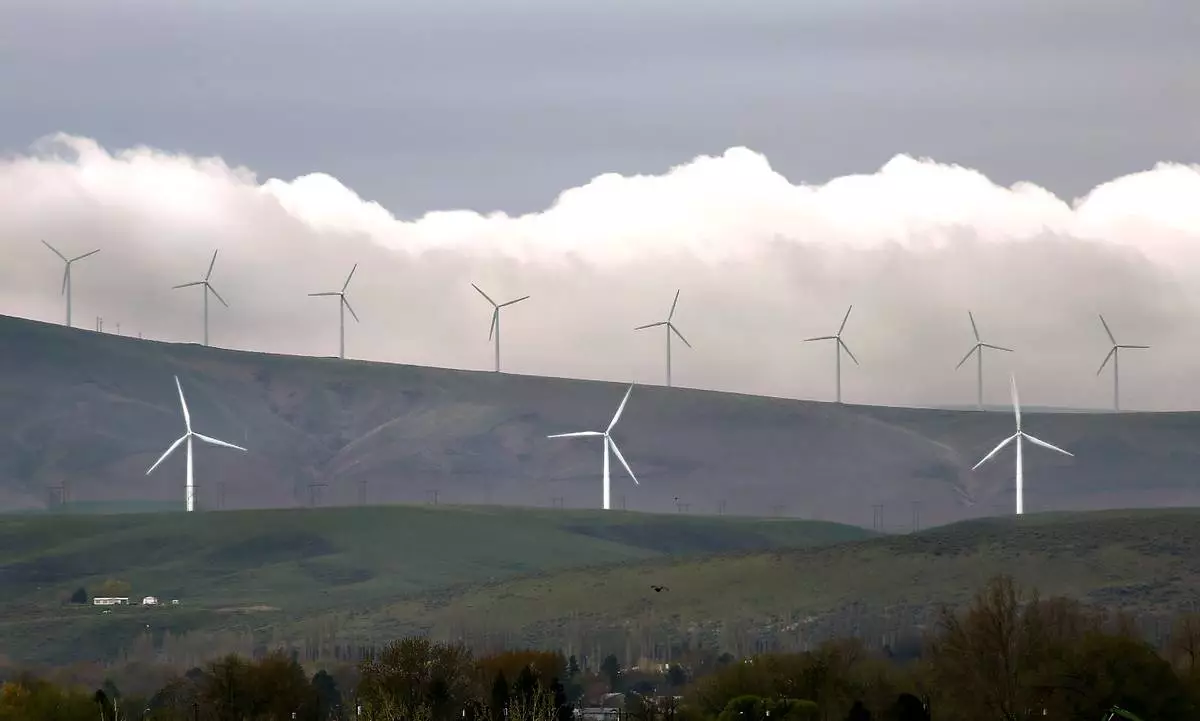
FILE - Wind turbines are seen on April 16, 2019, south of Kennewick, Wash. Washington Gov. Jay Inslee on Thursday, May 23, 2024, rejected a recommendation to cut a proposal for what would be the state's largest wind farm in half, giving new life to the $1.7 billion project. (Bob Brawdy/The Tri-City Herald via AP, File)
The Democrat-controlled Vermont legislature returned to the Statehouse on Monday to try to override Republican Gov. Phil Scott’s vetoes, including his rejection of a bill cracking down on the use of online personal data by companies.
By Monday afternoon, the House and Senate had overturned the governor's veto of a bill that requires state utilities to source all renewable energy by 2035, making Vermont the second state with such an ambitious timeline. Scott had said the renewable energy bill would be too costly for ratepayers. Under the legislation, the biggest utilities will need to meet the goal by 2030.
"The renewable energy standard will put Vermont on track to achieve 100% renewable electricity by 2035, dramatically reducing planet-warming carbon pollution and saving Vermonters money over time," said Senate President Pro Tem Philip Baruth in a statement. The Democrat called the governor's veto an attempt to continue rejecting “critical progress on climate action" at a time when Vermonters still are facing "the impacts of recent climate disasters.”
"The Senate has made clear that the status quo is unacceptable and will continue our unwavering commitment to addressing the climate crisis,” he said.
The legislature also voted to override his vetoes of a property tax bill to pay for education that would increase property taxes by an average of nearly 14% and create a committee to recommend changes to make Vermont’s education system more affordable. Scott has said Vermonters cannot afford double-digit tax increases.
Each chamber needs two-thirds of those present to vote to override to be successful in passing the bills.
Scott vetoed eight bills this session, saying last month that the Legislature is out of balance and at times "focuses so much on their goals they don’t consider the unintended consequences.” While his vetoes aren't popular in Montpelier, “I’ll take that heat when I believe I’m making the right choice for the everyday Vermonter,” Scott said.
The data privacy bill was considered to be among the strongest in the country that would allow consumers to file civil lawsuits against companies that break certain privacy rules. Scott vetoed the legislation last week, saying it would make Vermont “a national outlier and more hostile than any other state to many businesses and non-profits.”
The Legislature expects to override his veto of a measure that restricts a type of pesticide that’s toxic to bees. Vermont’s legislature passed the bill after New York Gov. Kathy Hochul signed what she described as a nation-leading bill last year to severely limit the use neonics in her state. Republican Gov. Phil Scott vetoed the legislation last month saying it “is more anti-farmer than it is pro-pollinator.”
The House on Monday also voted to override the governor's veto of a bill allowing the creation of a pilot overdose prevention center in Burlington, including a safe injection site where people can use narcotics under the supervision of trained staff and be revived if they take too much. But the Senate failed to have enough votes to override and later a Republican senator said he wanted to reconsider his vote, with a revote likely happening on Tuesday.
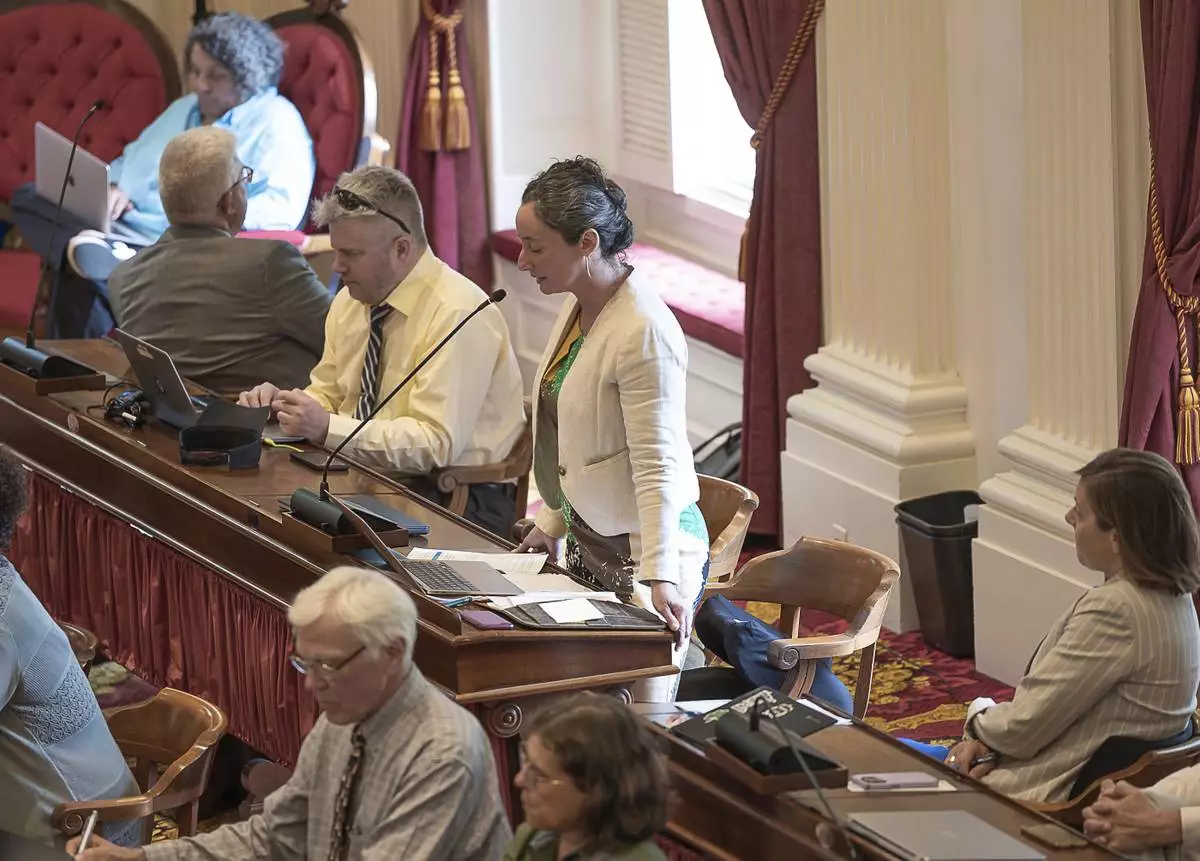
Vermont House Rep. Emilie Kornheiser, a Democrat from Brattleboro, addresses lawmakers Monday, June 17, 2024, as the Democrat-controlled Legislature considers overriding some of Republican Gov. Phil Scott's vetoes, in Montpeler, Vt. (Sarah Milligan/The Times Argus via AP)
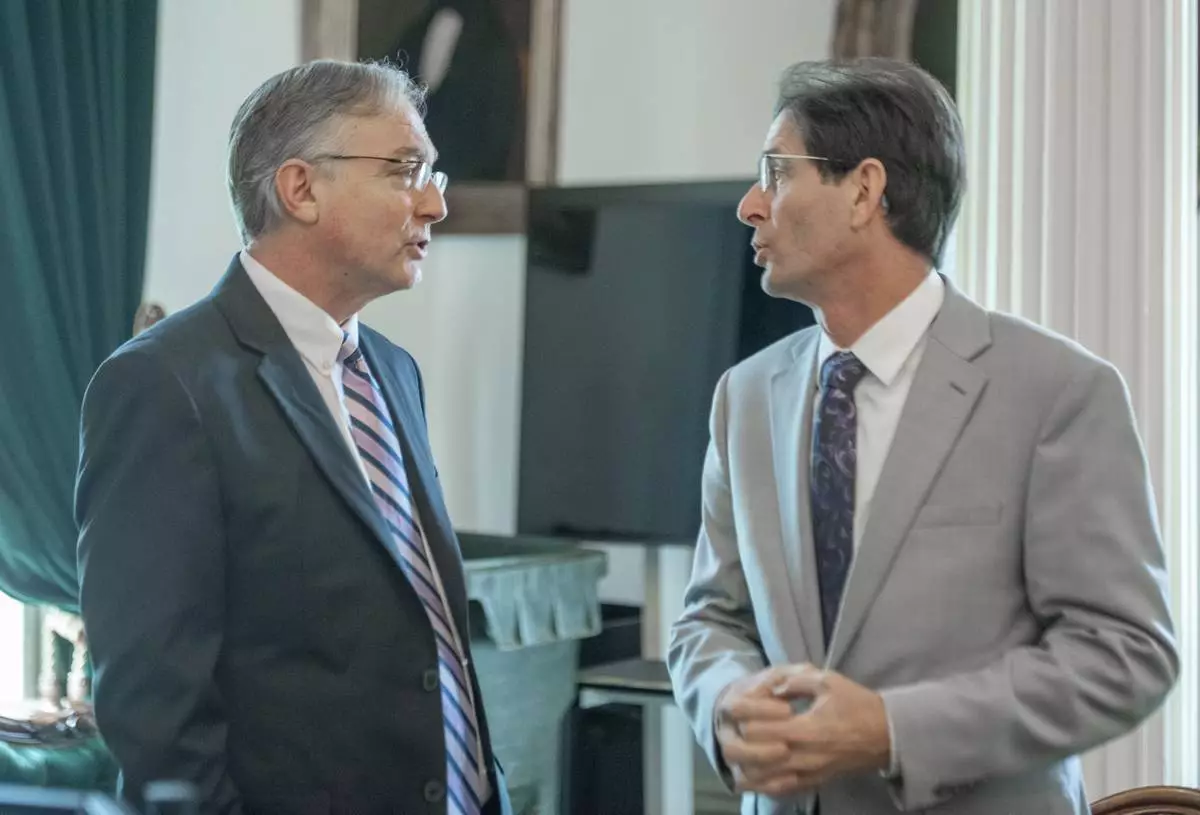
Senate President Pro Tem Philip Baruth, D-Chittenden, left, and Lt. Gov. David Zuckerman speak during a veto override session on Monday, June 17, 2024, at the State House in Montpelier, Vt. The Democrat-controlled Vermont legislature has returned to the Statehouse to try to override Republican Gov. Phil Scott’s vetoes. (Jeb Wallace-Brodeur/The Times Argus via AP)




